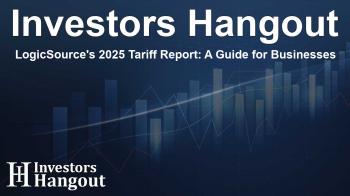LogicSource's 2025 Tariff Report: A Guide for Businesses

LogicSource's Comprehensive 2025 Tariff Report Unveiled
LogicSource, a prominent name in procurement services and technology, has recently unveiled its detailed report focusing on the significant implications of upcoming tariff changes. This report is designed to assist businesses in navigating the challenges presented by rising costs and supply chain disruptions.
Understanding the Impact of New Tariffs
The released report highlights that proposed tariffs related to goods will be introduced soon, affecting various categories associated with indirect spending. The imminent tariffs are expected to impact products sourced from diverse regions, including Mexico, Canada, and China. As businesses prepare for these changes, LogicSource emphasizes the urgency for companies to take proactive measures to mitigate risks and uphold their operational integrity.
Projected Cost Increases from Tariffs
According to the report, significant cost increases are anticipated across multiple sectors. For example, businesses may face a staggering 20-30% rise in IT hardware expenses, alongside increases of 15-25% for plastic packaging and between 30-60% for HVAC systems. Collectively, these adjustments could influence around 90% of IT hardware spending and 80-90% of packaging materials required by various industries.
Expert Insights on Cost Management
CEO of LogicSource, Dave Pennino, shared insights on the importance of addressing indirect costs often underestimated by organizations. He highlighted that these expenses can make up a significant portion of overall spending. Companies ready to act decisively can utilize this situation as an opportunity to streamline their expenses, improve supplier engagements, and foster long-term business resilience.
Strategies to Mitigate Risk and Maintain Stability
LogicSource has outlined a series of actionable steps for businesses aiming to navigate the implications of the forthcoming tariffs effectively. Here are five crucial strategies recommended:
- Prioritize Critical Needs: Businesses should focus on essential spending categories that have the most significant impact on their operations.
- Explore Alternative Sourcing: Shifting sourcing to low-tariff or domestic regions can enhance supply continuity.
- Expand Supplier Networks: By diversifying suppliers, businesses can reduce dependence on any single source.
- Strengthen Negotiation Strategies: Firms are encouraged to collaborate closely with their suppliers to optimize contracts and lessen tariff burdens.
- Enhance Inventory Management: Leveraging artificial intelligence and bulk purchasing can significantly improve supply chain adaptability.
Historical Perspective on Tariffs
In previous years, such as in 2018, tariff impositions notably affected consumer prices, particularly for imported consumer goods like electronics and furniture. Associate Partner, James Bouchard, pointed out that the new tariffs present even broader implications, likely resulting in increased costs for a wider range of imported products and further exacerbating price increases across various sectors.
Looking Ahead: Phased Implementation of Tariffs
The phased implementation of the new tariffs is anticipated to roll out starting in the first quarter of 2025, with impacts expected to escalate by the fourth quarter. Early effects will be seen in categories such as electronics and industrial components, with additional categories affected over time.
About LogicSource
LogicSource is dedicated to enhancing procurement practices through innovative technology and strategies tailored to improve profit margins and ensure supply chain reliability. As a forward-thinking company in the procurement sector, it focuses specifically on indirect goods and services, which often represent a substantial portion of an organization’s spending. By leveraging its extensive experience and advanced technology, LogicSource offers clients a unique approach that aligns with their individual procurement needs.
Frequently Asked Questions
What is the purpose of LogicSource's 2025 Tariff Report?
The report aims to guide businesses on how to manage increased costs and disruptions in the supply chain resulting from the upcoming tariffs.
What are the key sectors affected by the new tariffs?
Key sectors include IT hardware, packaging materials, and construction equipment, which are expected to see significant cost increases.
How can businesses prepare for the impact of tariffs?
Businesses can prepare by prioritizing spending needs, diversifying suppliers, and enhancing negotiation and inventory management strategies.
Are there strategies to mitigate the risks associated with tariffs?
Yes, LogicSource recommends five steps, including exploring alternative sourcing and strengthening supplier negotiations.
What insights did LogicSource's CEO provide?
Dave Pennino highlighted the importance of acting swiftly to optimize costs and establish robust supplier relationships in light of tariff changes.
About Investors Hangout
Investors Hangout is a leading online stock forum for financial discussion and learning, offering a wide range of free tools and resources. It draws in traders of all levels, who exchange market knowledge, investigate trading tactics, and keep an eye on industry developments in real time. Featuring financial articles, stock message boards, quotes, charts, company profiles, and live news updates. Through cooperative learning and a wealth of informational resources, it helps users from novices creating their first portfolios to experts honing their techniques. Join Investors Hangout today: https://investorshangout.com/
Disclaimer: The content of this article is solely for general informational purposes only; it does not represent legal, financial, or investment advice. Investors Hangout does not offer financial advice; the author is not a licensed financial advisor. Consult a qualified advisor before making any financial or investment decisions based on this article. The author's interpretation of publicly available data presented here; as a result, they should not be taken as advice to purchase, sell, or hold any securities mentioned or any other investments. If any of the material offered here is inaccurate, please contact us for corrections.
